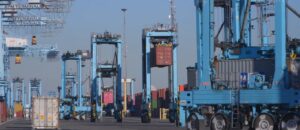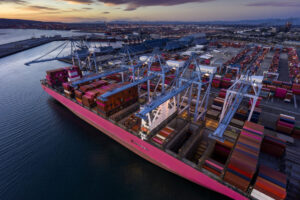The European Investment Bank (EIB) has agreed to donate almost $154 million to the upgrade and expansion of the Port of Piraeus, the largest port in Greece.
It is the largest loan ever made for port investment in Greece and will support the implementation of other investments, which so far amount to approximately $660 million from COSCO, the state-owned Chinese maritime giant.
Port Technology reported in October 2019 that COSCO had had its investment plan for Piraeus approved by Greece’s Committee of Planning and Development of Ports.
This week, Chinese President Xi Jinping signed a memorandum of understanding with Greek Prime Minister Kyriakos Mitsotakis, with both stating their mutual determination to accelerate free trade between China and Europe.
“We want to strengthen Piraeus’ transshipment role and further boost the throughput capacity of China’s fast sea-land link with Europe,” Xi said following the meeting.
Beijing has made Piraeus a key part of its Belt and Road Initiative. In 2009 COSCO took a 51% stake in Piraeus as part of a 35-year concession agreement.
Mitsotakis said he wanted Piraeus to become Europe’s premier port and that COSCO’s future spending could exceed $1 billion. He also welcomed the EIB’s support for the Port’s “transformation”.
“The EIB has been supporting strategic infrastructure across Greece for more than 50 years and has unique technical and financial expertise financing leading ports across Europe and worldwide,” he said.
Furthermore, Andrew McDowell, Vice President of the EIB, also commented: “Redevelopment of the Port of Piraeus will strengthen connections between Greece and the rest of the world and ensure that Greece benefits from a world-class maritime logistics hub.
“The European Investment Bank is pleased to provide a 20-year long-term loan for the principal maritime hub of Greece and the leading port in the Mediterranean.
“EIB support reflects the economic benefits to be unlocked in the coming years and the importance of ensuring competitive transport links for Greece and South Eastern Europe.”








